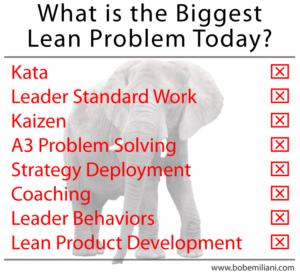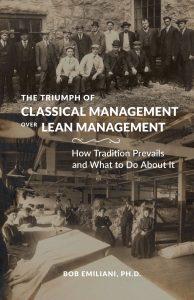 Don’t ignore the elephant in the room.
Don’t ignore the elephant in the room.
It started with value stream maps in 1999. It was the first tool used for the purpose of generating additional interest in what was then called “Lean production.” From there, kata, A3 reports, coaching, leader standard work, gemba walks, Lean strategy deployment, and now Lean product development. One Lean tool after another has been featured to fuel interest in what we now call “Lean management.” These “flavor of the month” Lean tools have been a distraction from the fundamental, existential problem that Lean itself faces.
After 30 years, we have only a handful of noteworthy enterprise-wide Lean transformations. That is much less success than was anticipated 30 years ago, and this would seem to put Lean in existential crisis mode. The lack of executive interest in Lean as a system of management to replace classical management is the elephant in the room that has long been ignored. If we care about Lean and want it to have a future, this should be the focus of our study and problem-solving work.
Like many things, attitudes and interests change over time. For a few decades, we were told that butter was bad for human health and specialists recommended alternative fats. Today, we are told that butter is good for human consumption. Regardless of the merits of Lean, one can expect time to be unkind to it, as it was to earlier forms of progressive management. Furthermore, Lean management is being overtaken by a flood of new tools and methods.
For 30 years, Lean was seen as something great that every company must adopt. But attitudes and interests in Lean changed over time. CEOs today have a broader perspective of the skills that employees must possess. They have become agnostic (unbiased) regarding the use of different tools, methods, and new technologies to solve the myriad problems that occur in each and every part of a business. The main requirement for CEOs is that employees fail fast, learn, and improve.
Declining interest in Lean among CEOs reduces it’s relevancy and threatens its existence. Time has clearly told us that most CEOs don’t want a new management system. Classical management is just fine. All that CEOs want is employees with better problem-recognition and problem-solving skills, with greater focus on root causes, and more rapid execution of problem-solving to yield tangible improvements. Lean (as distinct from Toyota’s management system) evolved too slowly over the last 30 years and is being eclipsed by time. The remnants — selected Lean tools — will survive, just as they did with earlier forms of progressive management. They will be subsumed into classical management practice.
 Curiously, Lean movement leaders chose to not address the “elephant in the room” in anything other than a superficial way. Evidence indicates they judged the problem too difficult and a waste of their time. But I was curious. I saw it as a wonderfully challenging problem that must be carefully studied no matter how long it takes. I spent 12 years figuring out this problem, culminating in the publication of The Triumph of Classical Management Over Lean Management last year. The book carefully examines seven areas of resistance (or inertia, if you prefer) in great detail: economic, social, political, historical, philosophical, legal, and business. Embedded within these are psychological elements that glue the seven together. It is a distasteful necessity to point out these details because Lean management may one day be called into service for a far more pressing need than to “banish waste and creating wealth in your corporation” — survival. So, we have to know the details of why CEOs reject Lean management. It matters, now and in the future.
Curiously, Lean movement leaders chose to not address the “elephant in the room” in anything other than a superficial way. Evidence indicates they judged the problem too difficult and a waste of their time. But I was curious. I saw it as a wonderfully challenging problem that must be carefully studied no matter how long it takes. I spent 12 years figuring out this problem, culminating in the publication of The Triumph of Classical Management Over Lean Management last year. The book carefully examines seven areas of resistance (or inertia, if you prefer) in great detail: economic, social, political, historical, philosophical, legal, and business. Embedded within these are psychological elements that glue the seven together. It is a distasteful necessity to point out these details because Lean management may one day be called into service for a far more pressing need than to “banish waste and creating wealth in your corporation” — survival. So, we have to know the details of why CEOs reject Lean management. It matters, now and in the future.
Corporations will always have a periodic need for some sort of transformation. The findings in Triumph of Classical Management Over Lean Management are not limited to Lean transformation. It applies to just about any corporate transformation. The need for transformation will not go away. Furthermore, the enormous amount of useful information generated about Lean leadership, Lean management, Lean transformation, and so on in the period from 1988 to 2018 will not be wasted. Lean management will remain appealing to the minority of CEOs who want to abandon inferior business principles and methods.
The elephant in the room, the lack of executive interest in Lean as a system of management to replace classical management, is not insurmountable. In the past, this problem was never understood well enough to do anything about it. Now, the problem is understood well enough to do something about it — to try new things in never-ending PDCA cycles. It is my hope that Lean movement leaders will stop relying on “flavor of the month” tools (fads) to fuel interest in Lean management. There is no more return on those investments. Instead, the focus must be on the fundamental existential problem that Lean itself faces. That will be the true source of progress.
